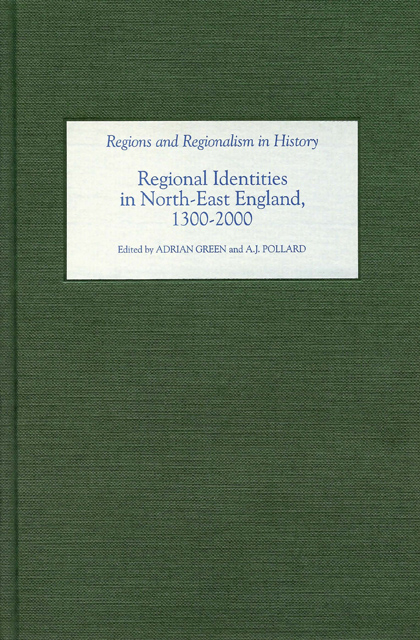Book contents
- Frontmatter
- Contents
- Foreword The AHRC Centre for North-East England History
- Dedication
- Contributors
- Preface
- Abbreviations
- Map
- Introduction Identifying Regions
- 1 North-East England in the Late Middle Ages: Rivers, Boundaries and Identities, 1296-1461
- 2 Borders and Bishopric: Regional Identities in the Pre-Modern North East, 1559-1620
- 3 Law in North-East England: Community, County and Region, 1550-1850
- 4 A Shock for Bishop Pudsey: Social Change and Regional Identity in the Diocese of Durham, 1820-1920
- 5 Business Regionalism: Defining and Owning the Industrial North East, 1850-1914
- 6 Competing Identities: Irish and Welsh Migration and the North East of England, 1851-1980
- 7 Immigrant Politics and North-East Identity, 1907-1973
- 8 Regionalism and Cultural History: The Case of North-Eastern England, 1918-1976
- Conclusion Conclusion Finding North-East England
- Index
7 - Immigrant Politics and North-East Identity, 1907-1973
Published online by Cambridge University Press: 10 March 2023
- Frontmatter
- Contents
- Foreword The AHRC Centre for North-East England History
- Dedication
- Contributors
- Preface
- Abbreviations
- Map
- Introduction Identifying Regions
- 1 North-East England in the Late Middle Ages: Rivers, Boundaries and Identities, 1296-1461
- 2 Borders and Bishopric: Regional Identities in the Pre-Modern North East, 1559-1620
- 3 Law in North-East England: Community, County and Region, 1550-1850
- 4 A Shock for Bishop Pudsey: Social Change and Regional Identity in the Diocese of Durham, 1820-1920
- 5 Business Regionalism: Defining and Owning the Industrial North East, 1850-1914
- 6 Competing Identities: Irish and Welsh Migration and the North East of England, 1851-1980
- 7 Immigrant Politics and North-East Identity, 1907-1973
- 8 Regionalism and Cultural History: The Case of North-Eastern England, 1918-1976
- Conclusion Conclusion Finding North-East England
- Index
Summary
Although many historians of the North East have analysed the interaction between migrant and host populations in the region, few have attempted to address the extent to which outsiders have engaged with notions of regional identity. This chapter considers two key migrant political campaigns, one from the period immediately preceding the First World War, the other from the late 1960s and early 1970s. Comparison of the two suggests how migrant identity could be shaped by the emergence of a selfconscious regional identity during the course of the twentieth century. Of all the movements of people, few transformed the region as dramatically as the arrival of Welsh, Scots and Irish workers in the 1850s, 1860s and 1870s. Taking note of English ‘emigration’ from the North East in the 1870s, David Byrne estimates that 37% of the 1911 population of the North East were born outside England or were children of migrants. Without the influx of labour, he suggests, the North East could not have found the workers needed for the region to achieve its industrial greatness. The Irish are particularly well known but many generations of migrants have shaped the region since, especially those who came to the North East from India, Pakistan and the West Indies after 1945.
The protagonist of the first campaign, John O’Hanlon, was one of Tyneside's most prominent Irishmen at the end of the nineteenth and beginning of the twentieth centuries. O’Hanlon rose rapidly through the ranks of Irish associational life in the region, from church groups to political organisations, representing the Irish party in the 1907 Jarrow by-election, and becoming mayor of Wallsend in 1913. He was a typical migrant Irishman in the North East of England, a second generation, skilled worker. A study of O’Hanlon's leadership reasserts the importance of the individual to the study of collective identities and suggests leadership of the Irish in Britain was often localised and diffuse. It also helps us to see that the region (or, more precisely, a locality within the region) was itself created in part by migrant experience. O’Hanlon's base was the mid-Tyne basin, a contiguous and identifiable part of Tyneside, comprising the towns of Jarrow and Hebburn on the south bank, and Wallsend,Walker and Willington Quay on the north.
- Type
- Chapter
- Information
- Regional Identities in North-East England, 1300-2000 , pp. 161 - 180Publisher: Boydell & BrewerPrint publication year: 2007



